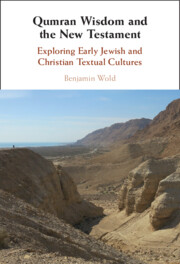Book contents
- Qumran Wisdom and the New Testament
- Qumran Wisdom and the New Testament
- Copyright page
- Dedication
- Contents
- Preface
- Acknowledgments
- Introduction
- 1 Cosmology and Eschatology
- 2 Universalism and Particularism
- 3 Wisdom As Action
- 4 Poverty and Humility
- 5 Debt Remission in the Matthean Lord’s Prayer
- 6 Paul
- Conclusion
- Bibliography
- Index
3 - Wisdom As Action
Published online by Cambridge University Press: 22 December 2022
- Qumran Wisdom and the New Testament
- Qumran Wisdom and the New Testament
- Copyright page
- Dedication
- Contents
- Preface
- Acknowledgments
- Introduction
- 1 Cosmology and Eschatology
- 2 Universalism and Particularism
- 3 Wisdom As Action
- 4 Poverty and Humility
- 5 Debt Remission in the Matthean Lord’s Prayer
- 6 Paul
- Conclusion
- Bibliography
- Index
Summary
Jas. 1:22 exhorts that one should be a “doer of the word” (ποιηταὶ λόγου) and not merely a hearer of the word; to only hear and not do is in fact self-deception. This theme of “doing” is returned to in two other parts of the epistle. In Jas. 2:14–26 we read that “faith by itself, if it has no works, is dead” (2:17) and Abraham is then drawn upon to illustrate this point. In 3:13 the author asks: “who is wise (σοφὸς) and understanding (ἐπιστήμων) among you?” to which he responds: “show by your good life (καλῆς ἀναστροφῆς) that your works are done with gentleness born of wisdom (ἐν πραΰτητι σοφίας).” This chapter explores James’ emphasis on the insufficiency of conceptual knowledge, the view that true wisdom requires action in light of Qumran wisdom.
- Type
- Chapter
- Information
- Qumran Wisdom and the New TestamentExploring Early Jewish and Christian Textual Cultures, pp. 97 - 115Publisher: Cambridge University PressPrint publication year: 2022

